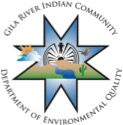Natural & Cultural Resources
Cultural Resources Management Program
The Cultural Resource Management Program (CRMP) was formed to help interpret, protect, and perpetuate the culture and traditions of Akimel O'otham and Pee-Posh tribes. The department provides cultural resource management and compliance services to all GRIC departments and other tribal and non-tribal entities working on the reservation, or in the interest of the Community, in fulfillment of GRIC ordinances and federal and state lawsand regulations. CRMP provides archaeological and cultural resource expertise for the management of archaeological sites, cultural properties, and for Community artifact collections.
Name: Kyle Woodson, Director
email: Kyle.Woodson@gric.nsn.us
Mailing Address:
P.O. Box 2140
Sacaton, AZ
85147
Physical Address:
192 South Skill Center Road, Bldg. 200
Sacaton, AZ
85147
Phone: 520-562-7150
Fax: 520-562-7193
Tribal Historic Preservation Office
Name: Reylynne Williams, Acting THP Officer
P.O. Box 2193,
Sacaton, AZ 85147
192 South Skill Center Road Bldg. 200
Sacaton, AZ 85147
Phone: (520) 562-7162
Huhugam Heritage Center
Please read more here.
Department of Environmental Quality

Mission Statement:
The Department of Environmental Quality honors the Community's cultural heritage by protecting, conserving, and restoring the Community's environmental resources.
Vision Statement:
A healthy, sustainable environment for our future generations
The Department of Environmental Quality (DEQ) is responsible for preserving and protecting the Community’s valuable natural resources, which include the air, water, land, and wildlife. The Department works with the U.S. Environmental Protection Agency and the U.S. Fish & Wildlife Service to ensure that facilities and activities within the Community’s boundaries comply with federal and tribal environmental laws and ordinances.
GRIC established the Department of Environmental Quality on August 1, 1995. Today, the DEQ includes programs that focus on environmental education and outreach, air quality, pesticides, waste management, water quality, and wildlife & ecosystems management.
DEQ follows guidance set forth by the GRIC Executive and Legislative Branches in establishing and enforcing GRIC Environmental Ordinances. DEQ also utilizes federal environmental & wildlife laws and regulations in the implementation of its programs and has assumed primacy, or federal delegation, for selected federal environmental programs.
In accordance with the 1984 Statement of Policy by the EPA entitled “EPA Policy for the Administration of Environmental Programs on Indian Reservations,” the Community fulfills the principle role as the appropriate non-federal party for decision-making and carrying out program responsibilities affecting the Community, its environment, and the health and welfare of its people. In keeping with this policy, DEQ co-regulates with federal agencies to ensure compliance with federal environmental & wildlife laws.
- Clean Air Act
- Clean Water Act
- Comprehensive Environmental Response, Compensation, and Liability Act (CERCLA)
- Solid Waste Disposal Act
- Resource Conservation and Recovery Act (RCRA)
- Hazardous and Solid Waste Amendments added to RCRA
- Toxic Substance Control Act
- Federal Insecticide, Fungicide, Rodenticide Act (FIFRA)
- Worker Protection Standard
- Endangered Species Act
- Bald and Golden Eagle Protection Act
- Migratory Bird Treaty Act
In addition to following federal environmental laws, DEQ currently enforces seven (7) Community Environmental Ordinances. Of these seven, three (3) of the earliest ordinances were developed to protect the Community’s agricultural resources and traditions.
- GR-06-85: Beehive Ordinance
- GR-07-87: Control and Suppression of the Pink Bollworm
- GR-05-14: Pesticide Ordinance
- GR-04-02: Medical Waste Ordinance
- GR-04-14: Waste Management Ordinance
- GR-01-08: Wastewater Management Ordinance
- GR-06-08: Air Quality Management Plan
Further, DEQ continues to develop new ordinances in response to emerging concerns. As DEQ’s Wildlife and Ecosystems Management Program matures, new wildlife and natural resources ordinances are anticipated to detail the Community's effort to protect and conserve its wildlife and natural resources. Lastly, in regards to the Community’s response to climate change, the Community’s Climate Adaptation Plan will allow the Community to properly assess and begin to address the vulnerabilities and unique challenges that accompany a changing climate.
Please visit DEQ’s official website for additional detailed information on the Department.
Name: Lisa Gover, Director
email: Lisa.Gover.DEQ@gric.nsn.us
Main: (520) 562-2234
Fax: (520) 562-2245
Mailing: P.O. Box 97 Sacaton, AZ 85147
Physical: 168 Skill Center Road Sacaton, AZ 85147
Pima-Maricopa Irrigation Project
The Pima-Maricopa Irrigation Project's (P-MIP) mission is to develop and construct a water delivery system for the beneficial use of Community water resources. P-MIP is planning, designing and constructing a water delivery system that will enable the Community to use its settlement and existing water resources to irrigate a system of approximately 95,000 acres.
Name: David DeJong, Director
email: DDeJong@gilariver.com
Mailing Address:
P.O. Box C
Sacaton, AZ
85147
Physical Address:
192 South A Street
Sacaton, AZ
85147
Phone: 520-562-6700
Fax: 520-562-6971
